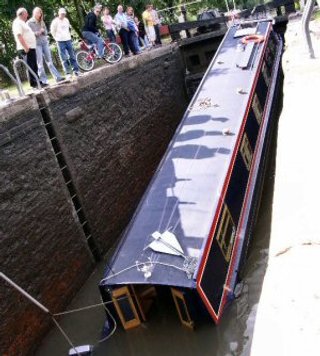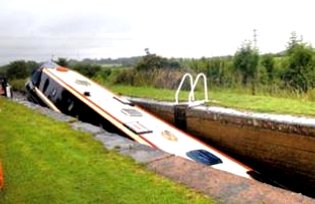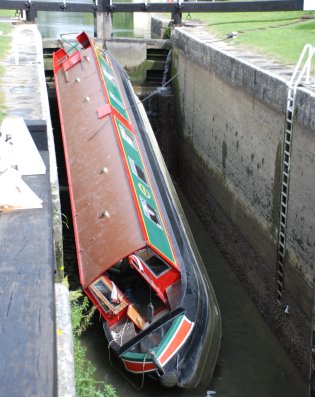I WAS not in the least surprised at our Allan Richards' report of so many boats sinking in locks, which much surely be down to the complete lack of proper lock tuition.
 My regular readers will be well aware of my concern about the lack of such tuition, particularly from the large hire companies, whose sheer numbers of customers preclude any comprehensive instruction, with no attempt of any being actually taken through a lock.
My regular readers will be well aware of my concern about the lack of such tuition, particularly from the large hire companies, whose sheer numbers of customers preclude any comprehensive instruction, with no attempt of any being actually taken through a lock.
But not only hirers, but people buying boats for the first time, many it seems who believe that as owners they are somewhat more knowledgeable than the 'mere hirer', and who I find are often a complete menace. Something often confirmed by contributors to narrowboatworld, who complain of the new 'know-alls' who know nothing.
 Having difficulty
Having difficulty
Often when approaching the lock at Derwent Mouth on the Trent & Mersey Canal, or even when moored above it, we are alerted to someone having difficulty with the lock. Time and time again we have seen all the paddles wide open, with a boat being slung about in the resulting stream of water passing through.
Even more times we have seen a boat driven into the lock, the bottom gates closed, only to swing open again before the top gate paddles can be opened, the gate being improperly hung. The boater not realising the only way to overcome the problem is to open a top gate paddle a little way to allow water to hold the gate closed.
 Such is the lack of tuition that many have problems even closing a paddle, not realising a simple thing like the ratchet that has to be disengaged to allow it to be wound down.
Such is the lack of tuition that many have problems even closing a paddle, not realising a simple thing like the ratchet that has to be disengaged to allow it to be wound down.
Not hung properly
The lack of proper maintenance, with every one of the broad locks on the Trent & Mersey Canal having at least one gate not hung properly that swings open, can present a challenge to the newcomer having had no actual instruction of the working of a lock.
Our own contributor, Ralph Freeman pointed out this particular problem, even with the narrow locks on this waterway in his recent article.
 With badly hung gates not only refusing to stay closed, but also being exceptionally difficult to open, the expedient of opening just a single gate on a broad lock makes it much easier, but few newcomers, unless told, are aware that their boat will easily pass through the opening of one gate.
With badly hung gates not only refusing to stay closed, but also being exceptionally difficult to open, the expedient of opening just a single gate on a broad lock makes it much easier, but few newcomers, unless told, are aware that their boat will easily pass through the opening of one gate.
Safety instructions
It is not only the working of locks, but simple safety instruction, such as not standing by the side of the tiller when reversing, that is all too important. This was clearly shown when a Canaltime hirer was killed when he revered his boat into the stone bank at Alrewas, the rudder striking the wall swinging the tiller over and the hirer into the water.
For a while after this a line was drawn on the rear deck of Canaltime boats showing where the steerer should stand.
My advice has always been for new would-be hirers to ask if instruction is given and whether they will be taken through a lock, and if not—go where it is. As for the private boater who buys a boat without any prior experience, there are people who give instruction on peoples' own boats, and who are well worth the expense.
A licence?
There are those who believe there should be a test and a subsequent licence issued before anyone is allowed to take a boat on the waterways, but surely this is just not practical.
It would kill the hire boat industry stone dead. For who would take the trouble to study and then take a test, paying for the use of a boat, just for the purpose of a holiday?
Others believe the hire company should test the newcomer, but this is wide open to abuse. As many of you may be aware I often holiday in Bermuda, where there are no hire cars—only mopeds, and it is up to the hire companies to test the hirers before they are allowed on the roads, and here comes the abuse. They are told to drive the moped down the road, and if they don't fall off, they have passed!
Good ones
It was some 18 years ago when I had my first introduction to the waterways, hiring a narrowboat from Pitstone Wharf on the Grand Union Canal, where the fella took us through two locks, pointing out the various dangers, including swinging the tiller over so it would not knock me into the water.
A little later it was a week's hire from Snaygill on the Leeds & Liverpool Canal, where the fella there insisted we wait the following morning so that he could take us through the lock.
These are examples of good hire companies, that are concerned about the people who hire their boats.
Victor Swift
